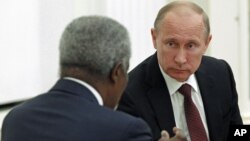After months of shuttle diplomacy, international envoy Kofi Annan has failed to produce a breakthrough in Syria's 16-month-long crisis
The U.N. Security Council remained deadlocked on a solution Thursday, with Russia and China vetoing a Western-backed proposal for sanctions against Damascus. It left Annan "disappointed," he said, at the lack of "strong and concerted action" that he has urged.
Now, with the fate of his mission unclear, observers disagree about how much responsibility Annan bears for the international failings.
Annan, a former U.N. Secretary-General, took the role of Joint Special Envoy for the United Nations and the Arab League in late February. He unveiled a six-point peace plan calling for a cease-fire and dialogue between Syrian government and rebel forces and traveled to Syria, its neighbors and world powers to appeal for support. But the conflict escalated.
The chief editor of Russian journal Russia in Global Affairs said Annan was given an "impossible" task.
Fyodor Lukyanov said traditional diplomacy might have worked last year, when the Syrian conflict was at an early stage.
"When Kofi Annan got this job, it was already too late because the mutual distrust [between the Syrian government and opposition] and level of violence was such that any kind of compromise was almost unthinkable," he said.
Lukyanov said Annan also was hampered by an inability of world powers to agree on how he should implement his peace plan.
"Both Russia and other great powers know that Annan cannot do more than they want him to do," Lukyanov said. "He's not that powerful."
Russia does not want any settlement to be imposed on longtime ally Syria, saying the principle of national sovereignty must be respected. Moscow fears Western and Arab-led intervention to topple Syrian President Bashar al-Assad could set a precedent for resolving future conflicts within nations.
Assad Unmoved
Mark Malloch-Brown, a former British diplomat who served as Mr. Annan's deputy at the United Nations in 2006, said the envoy also has faced a resilient Syrian president. He said the Syrian leader has been able to hang on to power and continue fighting the opposition with the help of external and internal support.
"Mr. Assad has still got Russian and to a lesser extent implicit Chinese backing," Malloch-Brown said. "He also similarly has support from two large neighbors - Iran and Iraq. So from his point of view, he's still got some cards to play. He also continues to enjoy a significant degree of internal support from minorities and from the Damascus merchant class."
Malloch-Brown said Annan succeeded in getting the U.N. Security Council to approve a Syria peace plan and achieve some consensus where it did not exist before.
"This six-point-plan has remained his objective from the beginning despite the huge difficulties and significant failures in getting it implemented," he said. "So he's persistent. And above all else he's calm. Lesser men would have run away from this a lot sooner," Malloch-Brown said.
Annan Criticized
But the head of Syria's main exiled opposition group, Syrian National Council chief Abdulbaset Sieda, said Annan has been "ineffective."
"In the last three months, more than 3,000 people were killed, mass killing happened and our cities and villages were attacked by the government's tanks, artillery, rockets and helicopters," he said. "And that happened during the time of the Annan peace plan."
Former U.S. Deputy National Security Adviser Elliott Abrams, now a Mideast expert at the Washington-based Council on Foreign Relations, said Annan has engaged in a diplomatic "facade" that enables world powers to avoid taking action.
"Our governments could say, well, you know Kofi Annan is on the case, and he's trying, and maybe this can be resolved, rather than facing the fact that this is a war and that one side or another is going to win," Abrams said. "So I think this has been really a very harmful effort and I think it should have been called off and I think he should quit now."
Abrams said Annan's attempt to balance the rival interests of world powers has been the "wrong model" for resolving the Syrian crisis.
"Unfortunately, he is acting more or less as he did as Secretary-General rather than acting in an urgent manner to stop the killing in Syria," Abrams said. "And I think that this effort has diminished and will diminish the reputation with which he left the job of Secretary-General."
On Thursday, White House spokesman Jay Carney said Annan's peace plan has failed.
Annan admits that he lacks results and that his mission cannot continue indefinitely.
In an interview with French newspaper Le Monde earlier this month, he said "we have not succeeded, and ... there is no guarantee that we will succeed."
But, the former U.N. chief also vowed to press on, asking rhetorically, "do we have ... alternatives?"
The U.N. Security Council remained deadlocked on a solution Thursday, with Russia and China vetoing a Western-backed proposal for sanctions against Damascus. It left Annan "disappointed," he said, at the lack of "strong and concerted action" that he has urged.
Now, with the fate of his mission unclear, observers disagree about how much responsibility Annan bears for the international failings.
Annan, a former U.N. Secretary-General, took the role of Joint Special Envoy for the United Nations and the Arab League in late February. He unveiled a six-point peace plan calling for a cease-fire and dialogue between Syrian government and rebel forces and traveled to Syria, its neighbors and world powers to appeal for support. But the conflict escalated.
The chief editor of Russian journal Russia in Global Affairs said Annan was given an "impossible" task.
Fyodor Lukyanov said traditional diplomacy might have worked last year, when the Syrian conflict was at an early stage.
"When Kofi Annan got this job, it was already too late because the mutual distrust [between the Syrian government and opposition] and level of violence was such that any kind of compromise was almost unthinkable," he said.
Lukyanov said Annan also was hampered by an inability of world powers to agree on how he should implement his peace plan.
"Both Russia and other great powers know that Annan cannot do more than they want him to do," Lukyanov said. "He's not that powerful."
Russia does not want any settlement to be imposed on longtime ally Syria, saying the principle of national sovereignty must be respected. Moscow fears Western and Arab-led intervention to topple Syrian President Bashar al-Assad could set a precedent for resolving future conflicts within nations.
Assad Unmoved
Mark Malloch-Brown, a former British diplomat who served as Mr. Annan's deputy at the United Nations in 2006, said the envoy also has faced a resilient Syrian president. He said the Syrian leader has been able to hang on to power and continue fighting the opposition with the help of external and internal support.
"Mr. Assad has still got Russian and to a lesser extent implicit Chinese backing," Malloch-Brown said. "He also similarly has support from two large neighbors - Iran and Iraq. So from his point of view, he's still got some cards to play. He also continues to enjoy a significant degree of internal support from minorities and from the Damascus merchant class."
Malloch-Brown said Annan succeeded in getting the U.N. Security Council to approve a Syria peace plan and achieve some consensus where it did not exist before.
"This six-point-plan has remained his objective from the beginning despite the huge difficulties and significant failures in getting it implemented," he said. "So he's persistent. And above all else he's calm. Lesser men would have run away from this a lot sooner," Malloch-Brown said.
Annan Criticized
But the head of Syria's main exiled opposition group, Syrian National Council chief Abdulbaset Sieda, said Annan has been "ineffective."
"In the last three months, more than 3,000 people were killed, mass killing happened and our cities and villages were attacked by the government's tanks, artillery, rockets and helicopters," he said. "And that happened during the time of the Annan peace plan."
Former U.S. Deputy National Security Adviser Elliott Abrams, now a Mideast expert at the Washington-based Council on Foreign Relations, said Annan has engaged in a diplomatic "facade" that enables world powers to avoid taking action.
"Our governments could say, well, you know Kofi Annan is on the case, and he's trying, and maybe this can be resolved, rather than facing the fact that this is a war and that one side or another is going to win," Abrams said. "So I think this has been really a very harmful effort and I think it should have been called off and I think he should quit now."
Abrams said Annan's attempt to balance the rival interests of world powers has been the "wrong model" for resolving the Syrian crisis.
"Unfortunately, he is acting more or less as he did as Secretary-General rather than acting in an urgent manner to stop the killing in Syria," Abrams said. "And I think that this effort has diminished and will diminish the reputation with which he left the job of Secretary-General."
On Thursday, White House spokesman Jay Carney said Annan's peace plan has failed.
Annan admits that he lacks results and that his mission cannot continue indefinitely.
In an interview with French newspaper Le Monde earlier this month, he said "we have not succeeded, and ... there is no guarantee that we will succeed."
But, the former U.N. chief also vowed to press on, asking rhetorically, "do we have ... alternatives?"












